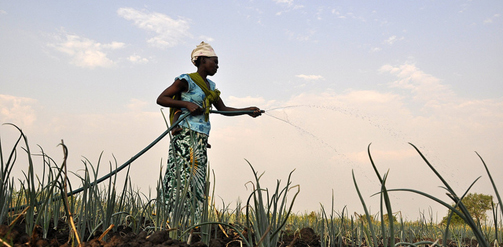Efficient action for women`s economic empowerment is about mainstreaming gender concerns within specific investments and projects, as well as taking a cross-sectoral perspective to promote responses to women`s priorities. In this blog, IDRC’s Arjan de Haan reflects on his recent attendance of the OECD Policy Dialogue on Women’s Economic Empowerment and findings from the IDS-led Balancing Unpaid Care Work and Paid Work project.

Representing the Growth and Economic Opportunities for Women (GrOW) program at IDRC, I recently attended the OECD Policy Dialogue on Women’s Economic Empowerment
The dialogue brought together over 100 policymakers and practitioners to share experiences in support to women’s economic empowerment, with a focus on the burden of women’s unpaid care – a great learning experience an opportunity to articulate insights of GrOW supported research on the care economy in India, Kenya, and from the multi-country study by an IDS-led consortium.
Enhanced commitment to gender equality…
There were important lessons on progress, but also clear future priorities.
The meeting demonstrated the enhanced commitment to address gender equality, shown in impressive attendance, and interventions of representatives of governments, of investment institutions like International Finance Corporation (IFC) and the European Investment Bank (EIB), civil society and private sector.
The OECD’s Social Institutions and Gender Index (SIGI) tool – presented in a side meeting – showed the growing global insight on women’s empowerment: SIGI importantly focuses on measures of formal and informal institutions, it’s carried out recent country studies in Uganda and Burkina Faso, and can provide important inputs for the monitoring of SDG 5.1.1 on the legal frameworks to promote equality and non-discrimination (PDF).
… but a dearth of concrete examples the reduce women’s double burden of care and work
At the same time, there still seems to be a dearth of concrete examples that reduce women’s double burden, and limited knowledge on what works, including how to change the social norms that underlie women’s disadvantages – with interesting examples of positive role models in Nigeria.
The discussion on infrastructure clearly highlighted the enormous importance of energy, water, and roads for women’s economic empowerment. The African Development Bank, for example, is integrating gender in investments, and experts battle the perception that infrastructure is gender neutral (‘roads are for both men and women’).
The discussion stressed that the capacity for implementing gender-equality commitment appears to remain limited. GrOW work showing the multiple ways in which empowerment is measured (PDF) underlines the need for continuing to sharpen approaches to and understandings of priorities to achieve SDG 5.
The SDGs are an important source of inspiration for action towards gender equality
UN Women’s Chief Statistician Papa Seck talked about SDG target 5.4, which focuses on recognizing and valuing unpaid care and domestic work.
This is contributing to important insights into how unequal the burden of work continues to be: across the countries (still limited) for which data exists, women send 18 per cent of their day in unpaid work, and men 7 per cent. The discussion noted that beside recognition, concrete measures to reduce and redistribute remain key priorities.
The discussion highlighted the need to look beyond – while recognising the key contribution of this work on measurement – unpaid and paid work.
In the measurement, especially in low-income context, the two cannot always be easily separated. Colleagues from WIEGO highlighted the importance of considering the burden of unpaid work for informal sector workers (PDF).
Research from the IDS-led consortium stresses, first, a critical point around women`s double burden, that poor women`s total hours of activity, combined with poor working conditions, leads to physical and mental depletion.
Possible solutions to women’s unequal burden? A gender perspective on infrastructure
The GrOW-supported research makes important contributions to this debate.
Research undertaken in a poor urban neighbourhood in Kenya is showing the possibility for solutions to women’s unequal burden. Public provision of childcare can have multiple benefits, to enhance women’s and children’s wellbeing, and allow women to explore opportunities in the labour markets.
The rigorous research shows – similar to the business case for employer-supported childcare presented by Henrietta Kolb, from the IFC Gender Secretariat, at the meeting – that in the Kenya case the benefits of childcare far outweigh the costs.
The need for a gender perspective specific to low-income contexts was evident in the discussion on infrastructure.
While public facilities for childcare are a key priority, rural women surveyed in the IDS-led research stressed that reducing their workload through public infrastructure, for example in water supplies, are a priority.
Efficient action for women`s economic empowerment, thus, is about mainstreaming gender concerns within specific investments and projects, but also calls for a cross-sectoral perspective to promote responses to women`s priorities.
Image: An irrigation project in Mozambique, run by Save the Children with UKaid support from the British government, has enabled women like Falesse to grow onions and tomatoes, which they can now sell in large quantities at the market. The income helps them to provide for their children and improve their living conditions. Credit: Marcos Villalta / Save the Children (CC BY-NC-ND 2.0)

